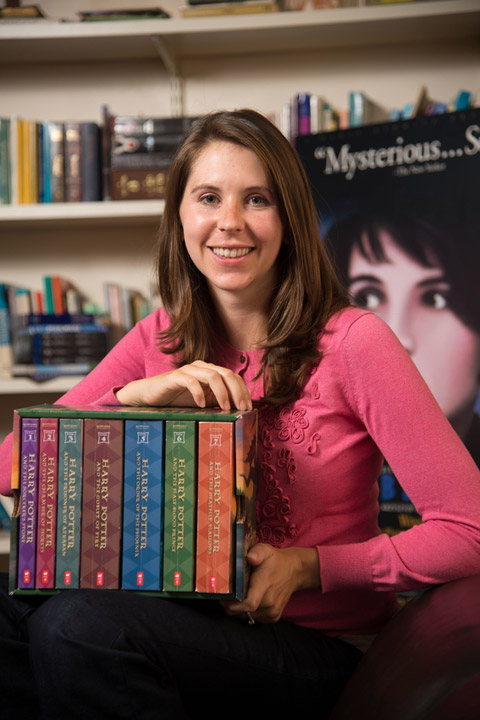Nazareth Professor Writes Book on Media Marathoning
Have you ever watched all eight Harry Potter movies in 24 hours? What about all the seasons of The Walking Dead within five days? After studying media marathoning for four years, gathering information from nearly 200 media marathoners and teaching a class on the subject, Nazareth College Professor Lisa Perks has put her research into her Media Marathoning: Immersions in Morality book, which is set to release in early-December. It is available for pre-order through Amazon and Lexington Books.
“Media marathoning has become a trend in recent years because we can download television, films, and books nearly instantaneously, enabling us to watch or read what we want, when we want, and how much we want,” said Perks, who is the director of Nazareth’s Communication and Media program. This book is a scholarly study of the intense relationship between reader and story world as it analyzes the way audiences become absorbed in a story and spend many hours exploring its narrative contours. Drawing from qualitative studies of book, film and television marathoners, along with textual analysis of commonly marathoned stories, Media Marathoning presents a holistic look at marathoning’s cultural impact.
Media marathoning is not just a trend emerging for teens and young adults: men and women of all ages are marathoning. These marathoners often turn to the internet to research more about their story or to communicate with other fans. Perks argues that the real power afforded by marathons is that readers or viewers can shape the experience of the narrative and have richer engagement with stories and fellow fans. The accessibility of digital technologies allows marathoners the ability to assert their rightful place in media’s creative sphere.
From her analysis of dozens of commonly-marathoned stories—from the Lord of the Rings film series, to The Hunger Games Book series, to How I Met Your Mother—Perks concludes that these stories implicitly argue for prized character traits, vividly represent the consequences of morally questionable actions, and suggest ways of effecting social change. Recognizing the complications of morality, these stories don’t provide us with answers; rather, they present possible pathways, feature multiple perspectives, and encourage readers to make their own decisions. Reviewer Lincoln Geraghty of the University of Portsmouth writes that Perks “presents a thoroughly researched and fascinating book that fills a gap in current scholarship on media audiences, morality, and the evolving practices of media consumption.”
Contact
Julie Long, Nazareth Chief Public Relations Officer: (585) 389-2456
Nazareth University is an inclusive community of inspired learners, educators, and changemakers who for 100 years have been driven by a bold commitment to action, empathy, equity, and leading innovation for the common good. Impact experiences are at the heart of a Nazareth education, preparing each student to discover within themselves the potential to cultivate positive change in their life's work, in any career field, and in a world that is constantly evolving and infinitely interconnected.
Our broad academic offerings present a range of study options typical of larger universities, yet achieved in our supportive campus culture. Nearly 2,100 undergrad and 600 graduate students enroll in degree and certificate programs and engage in collaborative, transformative learning experiences, preparing for the professions and society of today and tomorrow. In a learning community that purposefully integrates liberal arts and professional programs, Nazareth University graduates are able to launch a lifetime of impactful leadership in communities and workplaces near and far.
